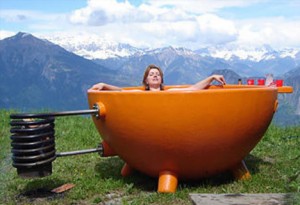 It seems counter-intuitive, but that’s what hot tub dealers like to say. They may have a point: after a long soak, the shower that follows will probably be quicker because you don’t need the warm water to warm you up in the cold winter months. And the water that gets dumped every six months or so can be used to irrigate nearby plants (provided the chlorine levels have dropped enough, if you don’t use bromine to keep it clean). And if you take regular baths, hot tubs are a much better substitute from a water conservation standpoint.
It seems counter-intuitive, but that’s what hot tub dealers like to say. They may have a point: after a long soak, the shower that follows will probably be quicker because you don’t need the warm water to warm you up in the cold winter months. And the water that gets dumped every six months or so can be used to irrigate nearby plants (provided the chlorine levels have dropped enough, if you don’t use bromine to keep it clean). And if you take regular baths, hot tubs are a much better substitute from a water conservation standpoint.
But when droughts hit, severe water rationing usually means that hot tub owners are encouraged not to fill their tubs (as happened in Santa Cruz recently). So if hot tub dealers feel the data are on their side in terms of water conservation benefits, they should study this issue to change policy decision-making.
In general though, hot tubs are an environmental negative due to the energy required to heat the tubs. Of course, if you have solar panels or live in some kind of eco-compound in the Rockies like Amory Lovins, then maybe you can be forgiven for indulging in warm water.
Either way, I’m up for doing a significant amount of research on this topic.


